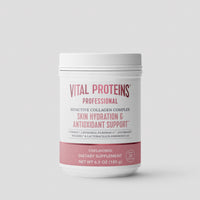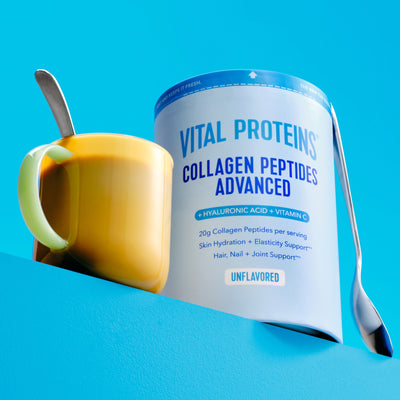When the warm weather hits, it's the dermatologists' time to shine. They're experts at crafting the perfect summer skincare routine. They know just the right product swaps to make and how to minimize sun damage and sweat-induced breakouts.
They could probably educate you on all the reasons to apply SPF in their sleep. So while we may all live underneath the same sun, it's clear that they've got a leg-up on the rest of us. Ready to learn their secrets? Here's how to protect your skin like a dermatologist this summer.
1. Apply vitamin C serum
Look on the bright side with this powerhouse serum. The potent antioxidant helps you transition from winter to summer by brightening up dull skin leftover from winter. Dermatologist Rachael Burns uses a serum that contains a strong concentration of vitamin C (20 percent), to help revive her complexion and brighten dull patches.
Ramya Kollipara, M.D., Board-Certified Dermatologist at Westlake Dermatology, also relies on more antioxidants, specifically a vitamin C, in the summertime. She likes the SkinCeutials CE Ferulic or Phloretin CF.
2. Opt for lighter products
Unless you're David from Schitt’s Creek, you wouldn't wear a sweater during the blazing heat. This same line of thinking applies to skincare products – lighter is always better.
Kollipara, for instance, swaps out her heavy moisturizer intended for extreme dry skin during the winter months for a lighter moisturizer. The need for this has to do with the summer heat.
"There is less tendency for water to evaporate (as it does during the colder/dryer winter months) and therefore choosing to use less moisturization leaves my complexion looking radiant," explains Burns tells Lively.
Vital Proteins® is your one-stop stop for radiant, glowing skin** this summer. Give Vital Proteins Beauty Collagen® a try. It's made with bovine collagen peptides, hyaluronic acid and other ingredients to help support your hair, skin and nails.**
Related Articles
3. They don't stop moisturizing completely
A warmer climate is no excuse to skip the moisturizer entirely.
"Moisturizers re-establish the stratum corneum, your outermost layer of the skin, which protects from harmful pollutants and chemicals and prevents further irritation or dryness," explains Dr. Ailynne Marie Vergara-Wijangco, a Clinical Dermatologist and Researcher with ThankYourskin.com.
As previously mentioned, opting for a lightweight texture will help keep that outer layer nourished without feeling too heavy on your skin. You can even use a dual-purpose moisturizer if you want to simplify your skincare routine even more.
"Adopting the use of dual or multi purpose moisturizers helps prevent clogging pores and putting unnecessary products on your face that achieve similar goals," says Anna Chacon, M.D., a dermatologist. If you’re still planning to skip the moisturizer this summer, Chacon says to cut down on your time in the shower since water can dehydrate the skin.
4. choose skincare products and makeup that are oil-free and non-comedogenic
In case you didn't know, non-comedogenic is a fancy word for a product formulated without pore-clogging ingredients. This serves two purposes: It decreases the oiliness of your skin and prevents clogging your pores.
"I naturally suffer from oily skin, so for me personally I cleanse my skin daily using a product that contains hydrating and purifying ingredients," Burns tells Lively. Her cleanser is gel-based as opposed to a cream-based formula, which would only increase oiliness.
You should also take a close look at your makeup product labels and only keeping products that are non-comedogenic, recommends Vergara-Wijangco. In addition to this, she says to wear makeup that won't occlude your skin. "That might include options like a powder sunscreen, an oil-free primer or a lightweight foundation."

5. apply sunscreen religiously
No matter the forecast, you should always take the time to apply SPF before heading outdoors. It's skincare 101.
"UV rays break down collagen and lead to premature aging so it's my number one priority when choosing an appropriate sunscreen," says Burns.
But it can be difficult to know which one to use. Physical or chemical? SPF 50 or SPF 30? For this, take a tip from the derms: Kollipara likes a SPF 50 or higher physical sunscreen with zinc and titanium, like ISDIN's Eryfotona Actinica.
Meanwhile, Burns uses an SPF-30 water-resistant sunscreen, which blocks 97 percent of the UVB rays. With so many different sunscreens available, the goal is to find what works for you. Burns' sunscreen is ideal for her lifestyle since it ensures she remains protected if she sweats due to the heat or working out.
6. They avoid direct sun exposure
You don't have to miss out on summer fun entirely – just ideally during peak sunlight hours (typically between 10 a.m. to 2 p.m.) Chacon recommends going outdoors after sunset or before sunrise or taking outdoor activities inside whenever possible.
We get it, though: it can be difficult to avoid the sun all summer long. This is where additional sun protection comes in. Think sun-protective clothing, wide-brim hats and sunglasses in the sun.
"We don't expect you to wear a long-sleeve shirt every single moment you're on the beach, but be mindful to expose as little of your body as possible to direct sunlight," says Vergara-Wijangco. "That might mean sitting underneath an umbrella, wearing an extra-large hat or avoiding the midday sun."
7. exfoliate
After the hibernation that was winter, it's time to slough away those dead skin cells. You can start slow by simply incorporating "more exfoliation" into your skin-care routine. "That doesn't mean a daily dose of all your favorite acids, but try slowly increasing the amount of days you exfoliate per week," says Vergara-Wijangco.
















